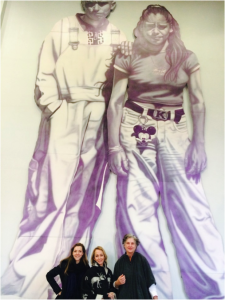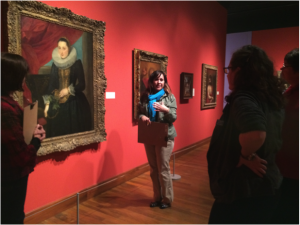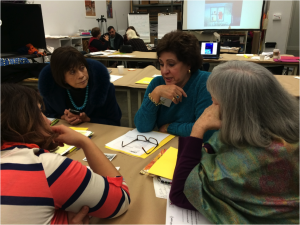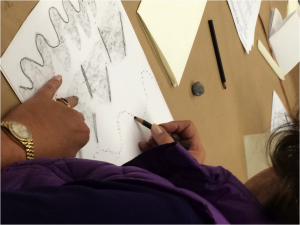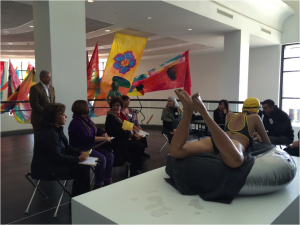IMLS Grantees collaborate at the El Paso Museum

Three different recipients of IMLS Grants collaborate to create a new model for the Latino communities in El Paso, Texas.
Thanks to a Museums for America IMLS grant, the El Paso Museum of Art and AVANCE, a national nonprofit dedicated to providing innovative education and family support services to hard-to-reach families, are using CALTA21 and ArteJuntos as models from which to build a program for Latino families enrolled in the AVANCE programs. This program will be looking at a combined way to address English as a Second Language (ESL), Spanish literacy for adults and their children, parent education and school readiness. So how does this collaboration begin?
As the first step in the partnership development, Helena Vidal, Project Manager for ArteJuntos, Patricia Lannes, Director of CALTA21and Karen Stein, Director of Education of the Katonah Museum of Art, were invited to design and deliver a joint Professional Development Institute at El Paso, Texas in November 2014.
Based on the premise that we learn through active participation, attendees spent three days interacting with each other and exploring ways that museums and visual literacy can be used to empower their Latino constituents and engage them as part of the museum community. Institute participants from the partnering organizations and other members of the El Paso community were given the opportunity to learn about the CALTA21 model and the ArteJuntos program, exploring their uniqueness and their common threads. After discussing the guiding principles and cornerstones that support CALTA21, attendees participated in many of the activities that are at the core of our curriculum “Identity, Portraiture and Photography.” They were able to participate in VTS discussions, and then were subsequently coached to facilitate VTS conversations for others in the museum galleries.
In this photo, an AVANCE Lead Parent Teacher facilitates a discussion in the galleries, and starts thinking about how her stakeholders can learn language and get new parenting skills from looking at art. As a way to get a better understanding of the CALTA21 curriculum, attendees actively participated in activities in the same way as they would if they were a teacher or a student participating in the program.
This photograph shows El Paso Museum of Art and AVANCE representatives working in small groups and listening to their colleagues share a personal story based on the Memorable Photograph curricular activity. Each activity concluded with a debriefing exercise where participants looked for threads and for reasons on why those activities are meaningful and useful for adult immigrants who also are English language learners.
After participating and discussing the adaptability of the CALTA21 curriculum for the El Paso, TX constituents, attendees explored the ArteJuntos program and participated in activities from their curriculum. Above, we can see a participant responding to the prompt “A line is a dot that goes for a walk.”
Towards the end of the sessions, participants explored the permanent collection of the El Paso Museum of Art in small groups and chose works that they would like to use with their AVANCE constituents. After selecting the works, they shared the activities they were planning with the rest of the group. The most important consideration during this planning exercise was to align their new knowledge with their stakeholder’s needs and strengths.
“This was a transformative experience, I will never see the world in the same way” said a museum docent. When asked why, she said that she now felt that she had developed crucial tools for working with the AVANCE families and that her future museum practice was changing forever as a result of the collaboration and training. AVANCE participants, who had been quiet at the beginning and were unfamiliar with the museum environment, explained how they began to feel comfortable and now believed that their families would enjoy the museum experience and benefit from it. Participants agreed that it was important to provide all populations with aesthetic encounters and found that learning how to look and find meaning in such encounters is not only at the core of all that we do in museums, but also an integral skill at the foundation of every learning experience. All participants affirmed that their constituents should have access to these tools to empower themselves.
As a culminating activity, participants were asked to reflect on the connections between CALTA21 and ArteJuntos that would be useful to apply when they start writing their own curriculum. These are some of the common thread participants found:
- Empowerment
- Inquiry-based: learner at the center, respect for learner
- Parent-child interactive, oral time
- Visual, writing and hands on – multimodal learning and listening, speaking, reading, writing and visual skills
- Applying and transferring skills
- Making participants conscious of their learning – metacognition: learning how to learn: higher order thinking skills
- Emphasis on language development through art – Art and museums as catalysts for learning
- Emotional impact by working with original works of art
- Flexible curriculum
- Spaces: museum informs classroom and home and vice-versa
- Foundation for life-long learning
- Universal themes
- Partnership and collaboration in curriculum development
- Focus on slowing down, looking and sharing ideas and perspectives
- Confidence development: speaking, sharing in the classroom and at the museum
- Art activities at home feed into the classroom and museum experience
As a result of the days spent in Texas, the El Paso team has acquired new knowledge and ideas to support the development of their collaborative project. We left participants with the task of thinking about what makes a successful museum experience and how that can be incorporated into a program that can be empowering, enjoyable and meaningful for their audiences.
_______________________
Karen, Helena and I left feeling that we had spent three very inspiring days in El Paso. In the course of the institute, we noticed a shift in relationships and the nature of the group. As the institute progressed, the group increasingly began to place emphasis on the value of collaboration and of programs built by developing collective knowledge. The time dedicated to reflecting on how CALTA21 and ArteJuntos serve immigrant audiences allowed us to envision future partnerships that will take our individual programs into a new collaborative dimension. We now hope that we have provided the participants with new tools to empower their practice and themselves, and that they will transfer those tools to their constituents when designing their future programs. We are thankful for IMLS for having supported us and believed in the power of museums to develop initiatives that engage and empower America’s newest residents.
-Patricia Lannes, CALTA21 Project Director

